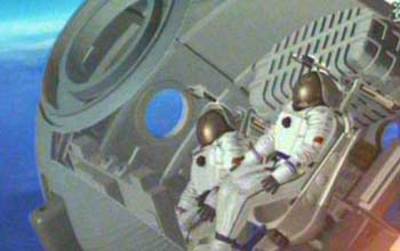When it comes to space travel, there are all kinds of dangers to watch out for – which is why astronauts spend years training to deal with things like equipment failure.
在太空旅行时,有各种各样的危险要当心——因此,宇航员耗时数年接受培训,才能应对设备故障等危险。
But sometimes it's the little, unexpected dangers that can cause big problems.
但有时候,引起大麻烦的是意想不到的小危险。
Like tin whiskers, for instance.
比如,锡须。

They may sound like something you'd find on a cute robot kitten, but these things are dangerous.
锡须的名字可能听起来像可爱猫咪机器人身上才会发现的东西,但锡须其实很危险。
See, metals with low melting points, like tin, zinc and cadmium, can spontaneously sprout microscopic whiskers little threads of metal that can extend for several millimeters like creeping vines.
因为,对于熔点低的金属来说,比如锡、锌、钙,它们会自发地喷射出一条条显微镜才能看到的金属须,这些须可以绵延几毫米,像攀爬的葡萄藤一样。
Scientists still aren't really sure why they happen, but the whiskers seem to grow in places where there's some mechanical stress on the metal say, if it's compressed a tiny bit.
科学家依然不太确定为何会如此,但须似乎会在金属受到压力的地方产生。
Either way, whiskers are a problem, because those metals are often used to plate electronics, and the whiskers are conductive.
无论产生原因是怎样的,须的存在都是个问题,因为这些金属是要用来给电子设备进行电镀的,而金属须是导电的。
So you can end up with a kind of electrical bridge between separate parts, which short-circuits them.
所以,最后,各个本是分离的部分之间就有了某种电桥,之间有了许多短路。
That can be a really big deal even on Earth, where whiskers have led to pacemaker recalls and caused temporary shutdowns in nuclear power plants.
这种情况即便在地球上也是个大麻烦,金属须的存在会让起搏器无法工作,并引起核电站的频繁暂时性关机。
But in the near-vacuum of space, they can be even worse.
但在接近真空的太空中,金属须的恶劣影响更严重。
At high voltages and low pressures, the whiskers can vaporize into plasma, causing what's known as a metal vapor arc.
在高压和低压的情况下,金属须会发生汽化,成为等离子体,引起金属汽弧。
These vapor arcs carry a lot of current, and can completely destroy electronics.
这些汽弧会携带许多的电流,彻底毁坏整个电子设备。
In fact, metal vapor arcs were responsible for the failure of at least four commercial satellites, and they broke one of the instruments on the Cassini orbiter.
实际上,金属汽弧已经导致至少4个商业卫星无法工作,还弄坏了卡西尼号上的一个设备。
And it's hard to make sure that whiskers don't happen.
而且很难保证不产生金属须。
But NASA has stopped using plating made of pure tin, zinc, or cadmium, which helps.
但美国宇航局已经停止对纯锡、锌、钙制成的镀层,这样多少能缓解点儿。
Another option is to coat the metal in a protective layer that stops the whiskers from getting very far.
还有一个选择:给金属镀上保护层,阻止金属须离得太远。
Otherwise, you could end up with electronics that randomly short-circuit and fail, which is not ideal on a spaceship or satellite.
否则,电子设备就会时不时地发生短路和无法工作的情况,这对太空飞船和卫星来说太致命了。
But even with all their equipment working properly, humans in space can still be in danger.
但即便所有设备都能正常运转,人类在太空里依然会面临危险。
Because even though it's probably not something you normally think of as risky, in space, sleeping is tricky for a whole bunch of reasons.
因为在太空里,由于多种原因,睡觉是十分危险的,不管大家信不信。
For one thing, astronauts have to anchor their sleeping bags to a wall to avoid sleep-floating through the cabin.
其一是因为:宇航员必须把睡袋吊在墙上,以避免在太空舱里睡觉的时候四处撞壁。
And while the possibility of waking up with your head banging against the ceiling is probably pretty annoying, the real danger of sleeping in space is the risk of getting killed by your own breath.
虽然因为头撞到天花板而醒过来是一件非常让人难受的事情,但太空里睡觉真正的危险在于会被自己的呼吸致死。
Not morning breath -- I'm talking about carbon dioxide poisoning.
我并不是说口臭哦,我说的是二氧化碳中毒。
Humans exhale carbon dioxide.
是人都会呼出二氧化碳。
It's a natural byproduct of our cellular metabolism, but it's also very toxic to us.
这是细胞新陈代谢的副产物,但对人类而言是有毒的。
Down on earth, the air is about 0.04% CO2, and not usually a human health concern.
地球上的空气中,有0.04%是二氧化碳,所以人类不需要担心二氧化碳中毒。
But CO2 concentrations can get a lot higher in a spacecraft's tight cabin quarters, and you can't exactly open a window to grab a breath of fresh air.
但二氧化碳在狭小的太空飞船舱里,密度会高出很多。而且又不能通过打开窗户的方式来呼吸新鲜空气。
Warm exhaled air doesn't rise in space, so if you're sleeping tethered to a wall, that air will just linger around your mouth, eventually creating a big bubble of CO2.
人体呼出的温热的气体并不会在太空里增加,所以如果宇航员将睡袋挂在了墙上,那么呼出的空气会在嘴附近流动,最后产生一个大大的二氧化碳气泡。
And that's really bad news.
这可不是件好事。
A CO2 concentration of 1% may leave you feeling drowsy, but a 5% concentration will leave you headache-y, dizzy, and confused.
二氧化碳的浓度一旦到达1%,人就会产生晕眩的感觉。但5%的浓度会导致人头痛、晕眩、糊涂。
And at 8% or more? You're dead.
8%的浓度会怎样呢?人就没了。
Of course, spaceships -- and the International Space Station -- have systems that filter out CO2 and circulate oxygen, but astronauts still need to make sure there's enough airflow near their sleeping pods so that death bubble never forms.
当然了,无论是宇宙飞船还是国际空间站都配有系统,可以过滤掉二氧化碳,并循环氧气,但宇航员依然需要确保睡袋附近有足够的空气流动,这样才不会形成死亡气泡。
Other kinds of human waste can be space hazards, too.
其他类型的人体排泄物也会形成危险。
And that's something we learned about the hard way.
在这方面,我们也是有过血泪史的。
The old Russian Mir station had a toilet system on board that vaporized urine and shot it out into space.
之前俄罗斯有个和平号空间站,上面的厕所系统可以将尿液汽化并射入太空。
That method seemed to work well enough – at least, until scientists realized that the cosmonauts' pee froze into tiny crystals that stayed in orbit for several weeks.
这个方法似乎很奏效——美中不足就是:科学家后来发现宇航员的排泄物被冻成了细小的晶体,在轨道上待了数周之久。
And because even a dust-sized particle can be dangerous when it hits with the speed of a bullet, their pee came back to haunt them.
即便是灰尘大小的颗粒也会造成危险,比如这种颗粒以子弹的速度撞击汽化后的人体排泄物,那么排泄物就有可能被弹回太空飞船。
Before the Mir was purposely burned up in the atmosphere in 2001, its solar panels had lost about 40% of their effectiveness.
在2001年和平号空间站被故意在大气层中烧毁之前,其太阳电池板已失去了40%的机能。
Being continually battered by frozen pee for 15 years will do that.
因为在连续15年的时间里,该空间站持续受到冰冻的排泄物晶体的撞击。
Today the ISS recycles its urine, which gets rid of the danger of pee debris, and the added benefit of providing the crew with extra drinking water.
如今的国际空间站已经能对尿液进行回收,这样就能避免尿液的晶体所造成的危险;此外还有一个好处是能为宇航员提供额外的饮用水。
So cheers to learning from past mistakes.
所以,我们要高兴,因为能从过去的错误中学习。
Thanks for watching this episode of SciShow Space, and thanks especially to our patrons on Patreon who help make this show possible.
感谢收看本期的《太空可续修》,尤其要感谢我们的忠实粉丝,是你们让节目办得红火。
If you want to help us keep making episodes like this, just go to patreon.com/scishow to learn more.
如果大家想帮我们制作类似本期的视频,可以登录patreon.com/scishow了解更多。
And don't forget to go to youtube.com/scishowspace and subscribe!
别忘记订阅youtube.com/scishowspace哦!













